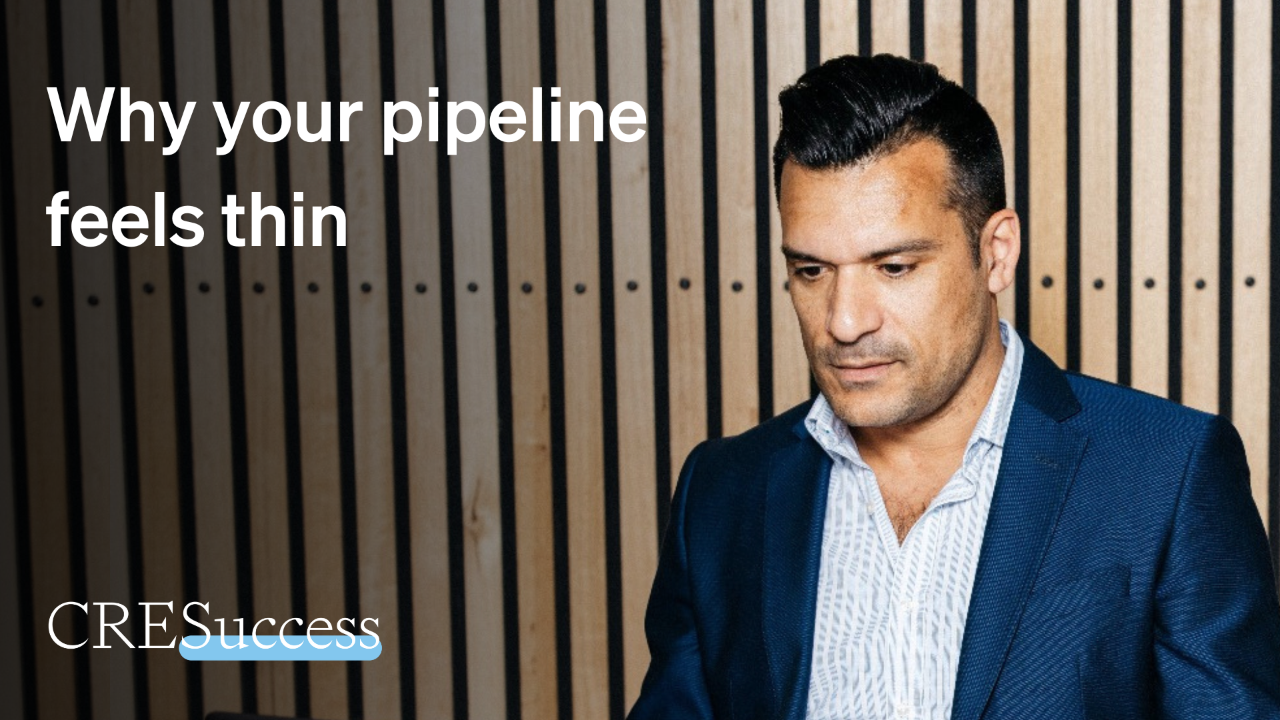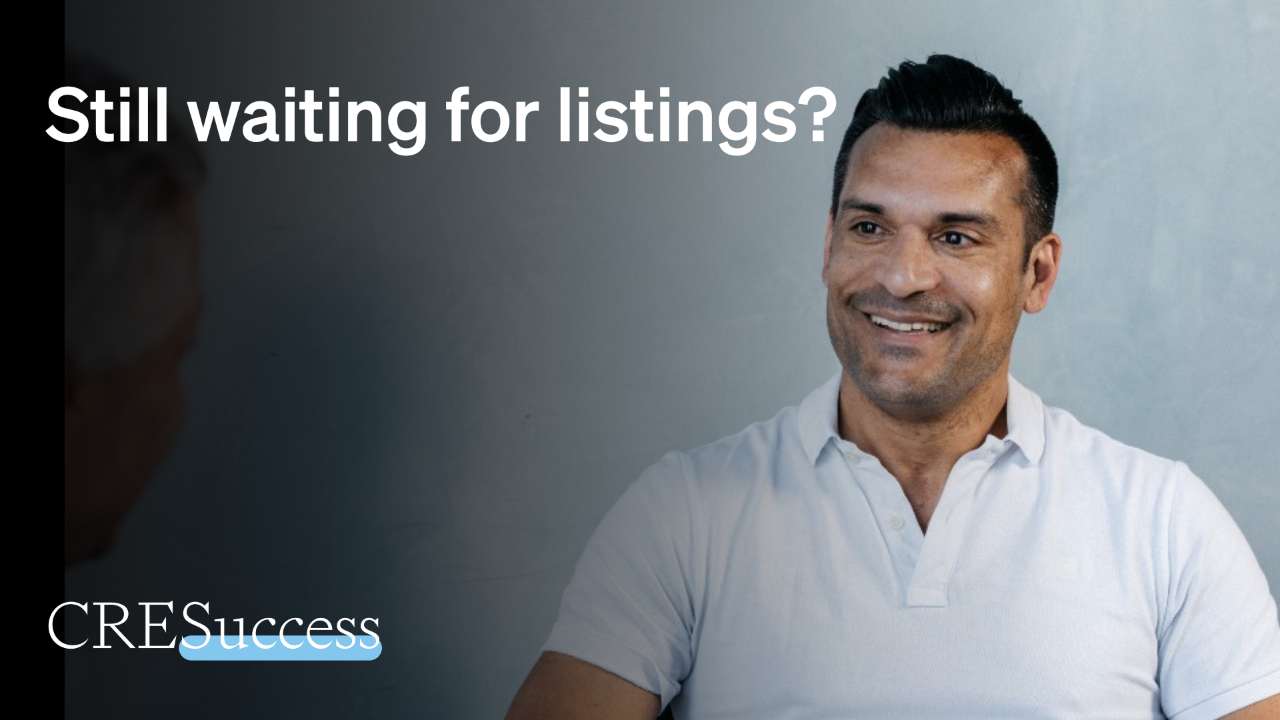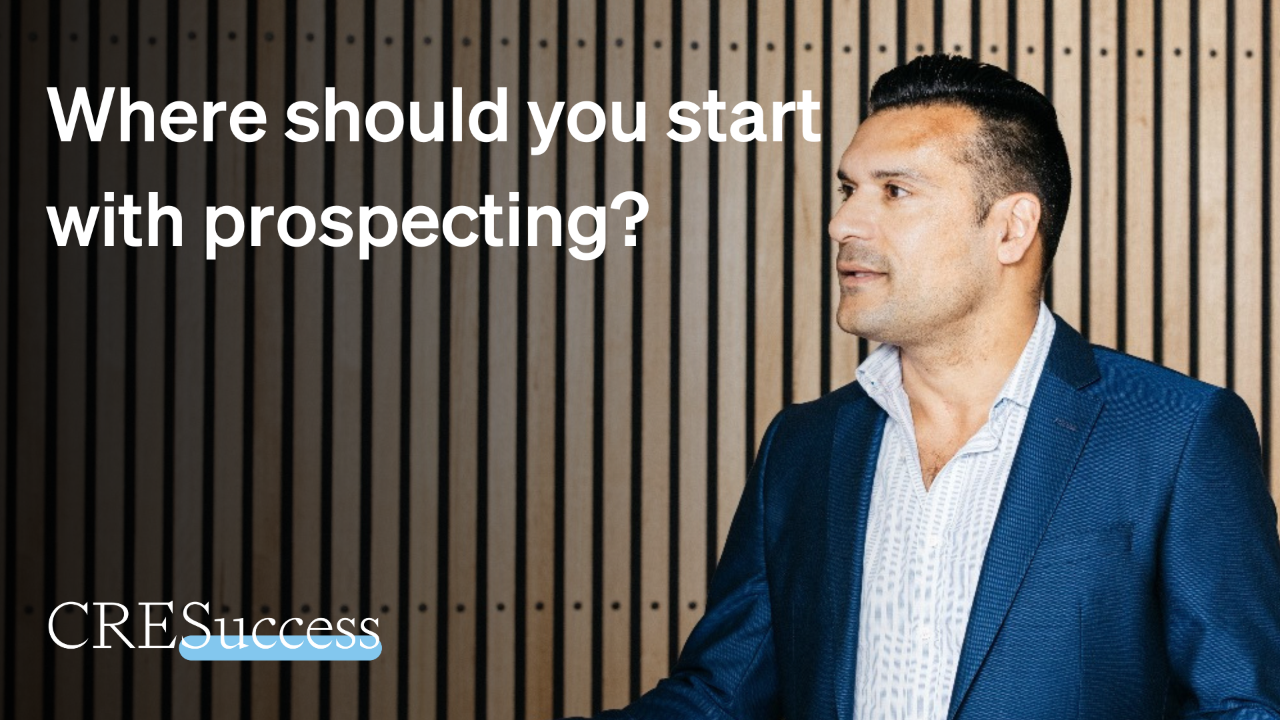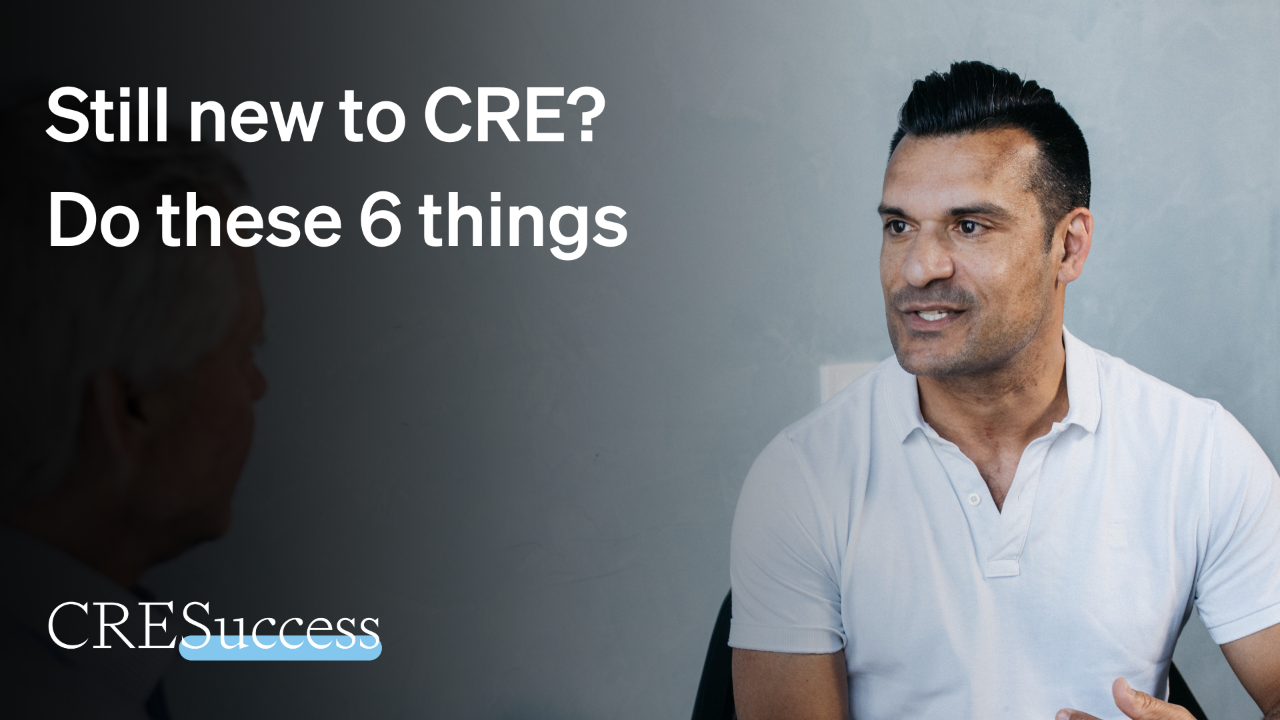It’s not enough to feel like you’re working hard.
May 24, 2023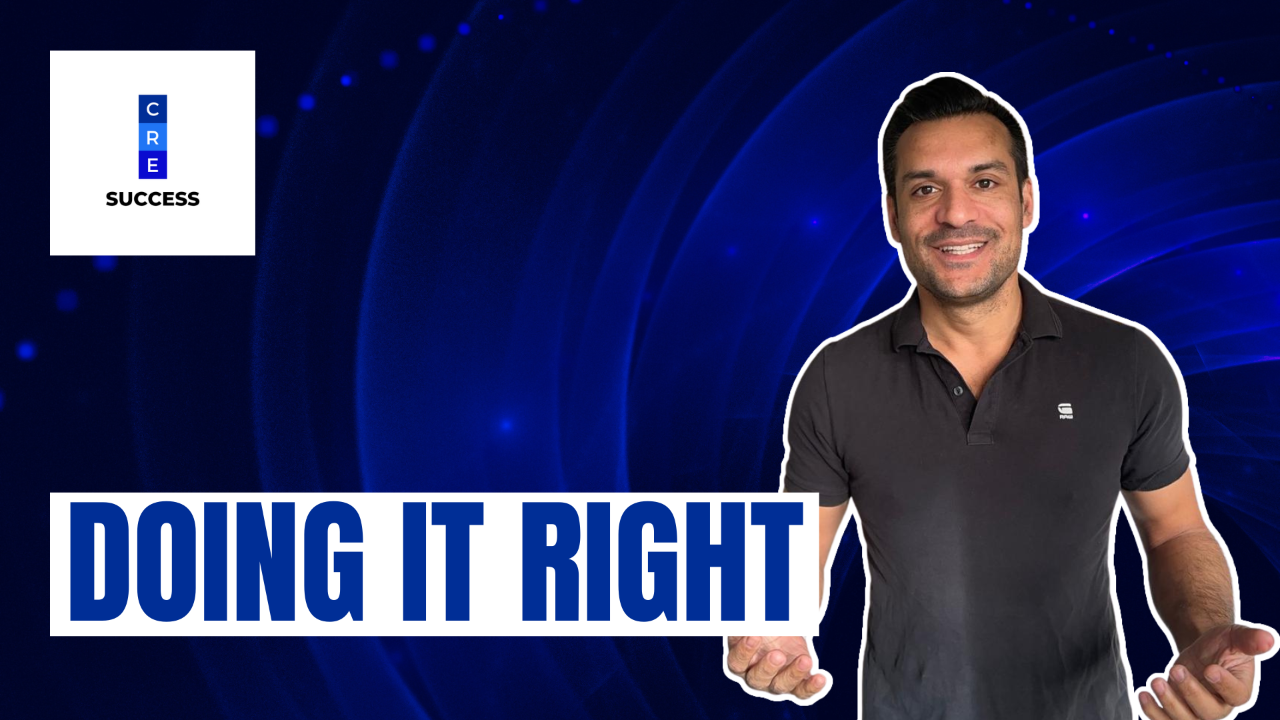
Today I want to dive into a topic that can make a real difference to your performance: getting help to make sure you’re not just doing, but also that your technique is correct.
Just as my new personal trainer has shown me with nearly every weight in the gym, it's not enough to feel like you’re working hard; we must do things right, and to the best of our ability, if we want to get the results.
Here’s why I bring this up: many of the commercial real estate professionals I speak to tell me that they’re doing the work, but that they’re not getting the results they desire.
The agents tell me that they’re already prospecting. The leaders tell me that they already have a business plan.
But instead of being willing to review and correct their technique on the fundamentals, some people believe that there must be something else they need to do – or that if they keep working hard doing the same thing, the results that they want will eventually come.
And look, sometimes the results will eventually come through repetitions and natural improvement…however, the results will materialise far more quickly if you’re doing the work in a way that leads to improvements in your technique, to the best of your ability and with a commitment to continuous improvement.
So, are you ready to take your success to the next level? Get into it by listening to episode 141 of CRE Success: The Podcast.
Episode transcript:
I've been doing cardio at the gym for years. I used to actually do weights, but I probably wasn't doing the weights right.
Or at least that's my conclusion. Because when I hired a personal trainer a couple of weeks ago, and he asked me to just get out there and start doing some stuff, he had a lot of corrections to my technique.
Now, I'm glad that I actually got the personal trainer in to help me because instead of saying, "You know what? I'm already doing that. I've done it in the past," so therefore, I'll just start doing it again, I thought, "Let's make sure I'm doing it right or to the best of my ability, or in a way, which is going to make the investment of doing this work actually yield the best possible results."
And there is a little bit of a parallel to that story with what I want to talk to you about in today's episode.
Because even if you're doing the things that you believe will get you the results in your business, whether it's the prospecting, whether it's providing that vision for your team, whatever it is that you know is important, doing them, and then doing them right, and doing them to the best of your ability are three different things.
And I want to talk to you today about why it is that if you're not doing things to the best of your ability, and you're not open to the idea of getting some support to improve those things, why that may be the case and what we can do about it. Let's discuss.
Hello, welcome to episode 141 of CRE Success: The Podcast. My name's Darren Krakowiak. And I help commercial real estate leaders to develop their people and to grow their business.
Always appreciate you spending a little bit of time with us each and every week.
And if you haven't yet shared this content with somebody who you've worked with appear in the industry, somebody who you think would benefit from what it is that we're producing each week, a quick little favor that you can do for me would be to press that share button and to let somebody know about this podcast about this content.
Because the more people we get it in front of, the more motivated that will be to continue producing it for you for free each and every week.
Alright, so today, I want to talk to you about the importance of doing what's required, but doing it the right way and to the best of your ability.
And not just saying, "Well, I'm doing that. So therefore, I don't need to explore it, or perhaps not being open to new ideas and support to do it better."
And the idea for this episode came from some conversations that I've had recently with people who I can tell are not performing to their full ability.
But they are rejecting the need to actually have a closer look at the way that they're doing things.
They're just looking at categories and saying, "You know what? Prospecting. I am prospecting. So, I don't need to spend any time looking at my prospecting. I don't need to invest in a program that can help me with prospecting, optimizing the way that I'm approaching potential new clients, the lead generation activity that I'm doing, the amount of time that I'm spending on the channels that I'm going with the messaging that I'm putting out there, etc."
So, I've got people who have looked at some of the programs that I offer, and said, "I've got that, I've got that. I don't need it."
I'm like, "Okay, that's fine."
But during the discussion that I've had with them we've established that their current performance is not where they want it to be.
So it might be that their GCI is stuck at a certain level. And it's been sort of plateauing around there for a few years.
Maybe they've had one good year here or there, but they're not breaking through to that next level.
Now, it's often not doing something that you're not doing. It's usually about doing what you're already doing, but doing it better, doing it more efficiently, working smarter, and focusing on more of the right things.
So, another way of looking at this is, sometimes I'm speaking to commercial real estate leaders.
And in the CRE Suite program, we've got 10 particular topics that we work with our clients through a one-year period.
And I've had some prospective clients look at this and say, "I've got that, I know how to do that. This I have covered."
And I think a lot of the time, that could be true.
But when I hear that from people whose business is not performing at the level that they wanted to, and it's been stuck at a certain level for a period of time, then my question is, "Why aren't you questioning more? How it is that you're doing those things that you say you already have covered if you're not actually getting the results that you want?"
And I guess the theory I've got is that you may be stuck in a fixed mindset, if you're not open to the possibility that you could actually do what you're already doing, but do it better.
I think that an advantage that you can have in life is to be open to the fact that you could be doing better than you currently are.
And that doing things better would lead to the results that you are looking for.
Now, I've been trying to figure it out, why is it that some people are resistant to taking a closer look at the way they're doing certain things?
And I haven't quite figured it out. But I've got some theories. I guess the first step two, resolving a problem is identifying that it exists.
And I think some people don't want to do the work. They think, "Well, you know, I've learned how to prospect, I don't want to learn how to do that, again, that's covered, what new have you got for me?"
Some people don't want to commit, some people don't want to admit that they need help.
Some people don't want to recognize that it's time to change course.
Maybe I'm not the right person to help them. Maybe it is me.
But I think often people also need to be in a certain state of whether it's frustration or desperation, to recognize that they need help.
And my advice would be, don't wait until you're in that situation in order to take a look at what it is that you're doing, and to figure out what it is that you need to do in order to get to where you want to go.
Because it's much easier to improve from a solid base than it is to stabilize when you're slipping.
And one thing that I've noticed, and that I've heard other people who are active in the professional development space talk about is that the most keen students are also generally the most successful ones.
And I think that if you believe that success leaves clues, then you may want to look at the approach that successful people have to improving themselves.
People who are already flying, still look for ways to get help to improve.
Because they have that growth mindset. They realize that what got them to this point is the help that they've gotten, but also that the help that they've gotten up to this point, maybe won't get them to the next point where they want to go to achieve that next phase of growth.
So, like I said, I think the best time to get help is when you're stable, or when you're growing rather than waiting until you need to be saved.
But my observation is that some people aren't willing to get the help that they need when they're stable.
But once they're stalling or once they're sinking, that's where they start to look for help.
So today is about identifying whereabouts are you in one of these four stages?
Are you growing? Do you have huge momentum? Do you have the wind at your back? You propelling ahead? Are you stable? Are you sort of just sailing through steady seas, not really, getting very far, but certainly not in any danger?
Are you stalling? Are you to use the boat metaphor marooned? And you know, maybe if you've got a team, people are thinking of getting off the boat? Or maybe some of your clients have started to walk off the boat and looking for other ways to get around? Or are you actually sinking? And are you people actually jumping for their lives in order to get off the boat?
And wherever you identify in terms of those four categories, whether you're growing a stable, you're stalling or you're sinking, I think that can influence not only the type of help that you may be looking for, but also your propensity to get it.
So, people who are growing, my observation is they're very open to getting help because that's how they keep on growing.
And often the support that people who are growing are looking forward to support that's best for them is to help them gain control over the growth and also letting go of certain things so they can focus on what is required to get their business, to get their production to the next level.
For people who are stable, it's often about small improvements. It's not about wholesale change.
And the recommendation that I have for these people is starting to understand how they can create leverage, whether it's through other people, whether it's through the platforms that they're using, or whether it's through processes that they can start to adopt.
And it's also a little bit about shifting their perspective, in order to get them more focused on growth.
For people who are stalling, who are perhaps stuck a little bit not stable, but actually stuck, they don't know how to create growth.
I think if we can get some quick wins, to show them what's possible, and then start working on their approach their mindset, so they can move from stable to growing, that's where we want to be.
And if you're sinking, well, sometimes people who are sinking the hardest to help. And if you are here, I'm sorry, that's where you are right now.
The target here is to patch up the boat, it's to stabilize the situation, and then to focus on growing.
So have a think about where it is that you are right now, whether you are growing, whether you're stable, whether you're stalling, or whether you are sinking.
And if you are in that stable stage, or maybe if you're just a little bit stalling, but not completely sinking, have a think about where is it that you can improve and what help that you can get in order to start to move into that growing phase, or at least to close the gap between where it is that you want to be and where you are now.
One way if you're a business owner to get that help is to attend our upcoming live and free workshop which is called 'Find, Keep & Grow Top Performers'.
And we are going to spend about 90 minutes together in this workshop.
Going through a few things, we're going to identify the three core business functions that every business has, but we're going to talk about how that relates specifically to your business and commercial real estate.
We'll identify the four main levers of growth inside a commercial real estate business. And then we're going to give you three specific strategies for one of those levers which is recruitment and retention.
We're going to show you how to attract the best people by turning your existing employees into an army of talent scouts.
We're going to show you how to retain great people by creating an alignment of interests so your people don't want to leave.
And we'll also show you how to develop your people, to help your top performers become even better, so they can become the best version of themselves inside your team.
If that sounds like it's of interest to you, you can register cresuccess.co/grow is the place to go if you would like to register.
That's our episode for today. Thank you so much for listening. I will speak to you soon.


